If you want to watch an enjoyable, if not very good, B movie, you could do much worse than to watch Captain Scarface, which is airing this evening at 6:30 PM ET on TCM.
Leif Erickson plays a man who in Central America who is down on his luck and is trying to get back to the States. When two men get killed in a fight in one of the hotel rooms, Leif gets a bright idea: steal one of their passports, and get pasage on a ship back to the USA. Obviously, Erickson didn't see Detour, or he would have known this wouldn't turn out well for him.
In this case, it turns out that the man he has to impersonate is a Communist agent, and the boat that he gets on is captained by a man (Barton MacLane) who is carrying out a Soviet plot to detonate a nuclear bomb in the Panama Canal, thus disrupting American shipping. The plot has involved the kidnapping of a German nuclear scientist and his lovely daughter (Virginia Grey), who will be killed if he doesn't go along with the plot. Our hero figures out part of what the plot is at least, but has trouble convincing the lovely daughter (of course, by this time he's also begun to fall in love with her) that he can really help.
It's all formulaic stuff, and done at a Poverty Row studio on a very cheap budget. (In the case of a rusting old boat, however, having cheap sets isn't such a bad thing.) Still, it provides more than enough entertainment value. And, it's good to see some of the people who generally were relegated to character roles get more leading roles.
You might think that a B movie like this that has no real stars and was made at a studio way, way down the pecking order would never get a DVD release. Paradoxically, you'd be wrong. That's because movies like this have a way of falling into the public domain, which means that anybody with a copy of the movie's elements can transfer them to DVD and sell the DVD, and at least one such distributor has it on sale, for the low, low price of only $5.95. I don't know what the quality of the DVD is like. Still, at $5.95, you can't really go wrong.
Tuesday, November 30, 2010
Captain Scarface
Posted by
Ted S. (Just a Cineast)
at
8:09 AM
0
comments
![]()
![]()
Monday, November 29, 2010
Leslie Nielsen, 1926-2010
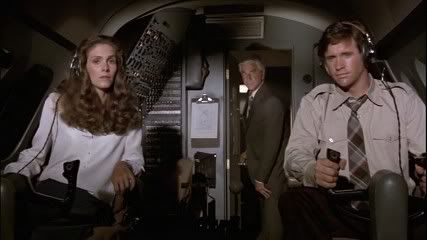
"Surely the reports of your death can't be serious!"
"They are serious. And don't call me Shirley."
By now you've probably heard the reports of the death of actor Leslie Nielsen, who died yesterday in Florida at the age of 84. Nowadays, Nielsen is probably best known for the second half of his career, when spoofs like Airplane! and the Naked Gun movies made him a star thanks to his deadpan delivery of highly memorable comedic material. As one wag on Twitter put it:
Leslie Nielsen died today at a Florida Hospital. It's a big building with doctors and patients, but that's not important right now. RIP.
 That having been said, Nielsen did start his acting career doing serious work. Forbidden Planet might not exactly be considered serious today, but it's certainly a cut or two above all the other sci-fi movies being made in the 1950s. Nor, I suppose is The Poseidon Adventure, in which Nielsen played the ship's captain. But then, Nielsen also made movies like Glenn Ford's Ransom!.
That having been said, Nielsen did start his acting career doing serious work. Forbidden Planet might not exactly be considered serious today, but it's certainly a cut or two above all the other sci-fi movies being made in the 1950s. Nor, I suppose is The Poseidon Adventure, in which Nielsen played the ship's captain. But then, Nielsen also made movies like Glenn Ford's Ransom!.
Posted by
Ted S. (Just a Cineast)
at
7:37 AM
0
comments
![]()
![]()
Labels: Obituary
Sunday, November 28, 2010
And he learned about dames
 The birth anniversary of choreographer/director Busby Berkeley (born November 29, 1895) is coming up tomorrow. TCM will be marking the occasion with seven of the many films on which Berkeley worked, creating some of the more outrageous dance numbers you'll ever see on screen. The first of these is one that I don't think I've ever mentioned before: 1934's Dames, at 6:00 AM ET.
The birth anniversary of choreographer/director Busby Berkeley (born November 29, 1895) is coming up tomorrow. TCM will be marking the occasion with seven of the many films on which Berkeley worked, creating some of the more outrageous dance numbers you'll ever see on screen. The first of these is one that I don't think I've ever mentioned before: 1934's Dames, at 6:00 AM ET.
As is the case with most Berkeley movies, the plot is secondary, and here it's somewhat reminiscent of the earlier Gold Diggers of 1933 (which is airing at 11:30 AM tomorrow). Hugh Herbert plays a wealthy "reformer" who wants to rid the world of smut, especially that sort of smut you'd see on the theatre stage when presented by showgirls. Herbert shows up at the New York mansion of his sister (ZaSu Pitts) and her husband (Guy Kibbee), not realizing that their daughter (Ruby Keeler) would like to be a showgirl herself, and that she's in love with a man (Dick Powell) who's written a Broadway show and trying to get it produced. Just as the girls in Gold Diggers of 1933 blackmail Guy Kibbee, there's a showgirl here (Joan Blondell) who can blackmail Kibbee, having ended up in his train compartment.
Of course the plot is silly stuff, as people went to see Busby Berkeley's movies for the extravagant musical numbers. Here, you've got Joan Blondell in a "Girl at the Ironing Board" routine, and of course the finale. Plus, Dick Powell introduced the song "I Only Have Eyes for You". Those who enjoy Berkeley's work will love Dames, although I, not being such a big fan of musicals, personally prefer Gold Diggers of 1933 and 42nd Street.
Dames has gotten a DVD release, both individually and as part of a Busby Berkeley box set.
Posted by
Ted S. (Just a Cineast)
at
8:18 AM
0
comments
![]()
![]()
Labels: Dick Powell, musical
Saturday, November 27, 2010
A Star is Bored
TCM's Essential for this week is the Judy Garland version of A Star is Born, at 8:00 PM. I've mentioned before that I'm not a big fan of Judy Garland's musicals, and this one is no exception. Not only that, but this is the reconstructed version of the movie. When originally released in 1954, theater owners thought it ran too long, and so the studio cut a good half hour of the movie out. (It's still too long, but that's another story.) In recent years, A Star is Born has gotten the same "restoration" treatment that Greed did: finding production stills, and sticking them into the movie where appropriate to show the plot points that got cut out. At least here, that only accounts for a half hour or so, and not close to two hours as in Greed.
Still, I'm sure some of you are Judy Garland fans. You'll probably love this. Actually, you'll probably love it again, since the Judy Garland fans would have seen it before.
Posted by
Ted S. (Just a Cineast)
at
8:26 AM
0
comments
![]()
![]()
Labels: jack carson, Judy Garland, musical
Friday, November 26, 2010
Frances Dee, 1909-2004
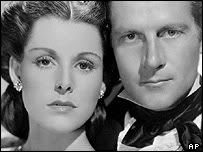 Today marks the birth anniversary of actress Frances Dee. She was a moderately successful actress in the early 1930s, until she met Joel McCrea, with whom she worked on several movies, including the previously recommended One Man's Journey. (That's McCrea in the picture with Dee; I believe it's a publicity still from 1937's Wells Fargo.) After getting married, and especially after having children, Dee worked more infrequently, ultimately retiring for good in the 1950s. Dee and McCrea were married for 57 years to the day, until his death in 1990.
Today marks the birth anniversary of actress Frances Dee. She was a moderately successful actress in the early 1930s, until she met Joel McCrea, with whom she worked on several movies, including the previously recommended One Man's Journey. (That's McCrea in the picture with Dee; I believe it's a publicity still from 1937's Wells Fargo.) After getting married, and especially after having children, Dee worked more infrequently, ultimately retiring for good in the 1950s. Dee and McCrea were married for 57 years to the day, until his death in 1990.
Since Dee didn't work too much after the 1930s, and she often wasn't the leading lady, I haven't recommended too many of her films. I also mentioned her in Becky Sharp, and she shows up as the other woman in the Bette Davis version of Of Human Bondage, which just aired yesterday.
Posted by
Ted S. (Just a Cineast)
at
8:11 AM
0
comments
![]()
![]()
Thursday, November 25, 2010
Thanksgiving at home
Now that we've all finished our travel, we get to celebrate Thankgsiving, that holiday when we sit down for dinner and celebrate just how dysfunctional our families are. I'm not certain what Hollywood's most dysfunctional screen family is. TCM is showing You Can't Take It With You at 11:30 AM this morning, but in that movie, the Vanderhofs really aren't dysfunctional. They just look it to everybody on the outside; in fact they're the only normal people around. A better example of a dysfunctional family, and one that's getting together for the holidays, might be the Plantagenets in The Lion In Winter.
And what's on the table? Why, The Chicken of Tomorrow. Happy Thanksgiving to everybody.
Posted by
Ted S. (Just a Cineast)
at
8:05 AM
0
comments
![]()
![]()
Wednesday, November 24, 2010
Turkey Day travel
I feel badly for those of you who have to travel long distances to get wherever you're going this Thanksgiving. Travel is a mess compared to the glamor it was back in the old studio-era movies. No TSA agents to fondle you, thanks to the Production Code forbidding that. I guess the closest a classic movie might have gotten would be the baby Peeping Tom in Gold Diggers of 1933. They didn't have the nude scanners either, since technology hadn't been well-enough developed in those days. It was just X-rays. The X-ray machines weren't even used for screening airplane passengers; it seems to me as though most of cinema's use of X-rays was in cartoons, for comic effect to show the insides of a character in much clearer detail than any real-life X-ray could.
And then there are the planes. The transatlantic plane that gets shot down at the end of Foreign Correspondent is impossibly well-appointed. A year later, in Never Give a Sucker an Even Break, W.C. Fields takes a plane that has a sleeping compartment like the railroad cars of the day. I suppose that's not too bad, since some of today's airlines have advertised business- and first-class seats that fold to completely horizontal for sleeping. But the W.C. Fields character wouldn't have been able to afford business class.
Perhaps the most fun is in John Wayne's The High and the Mighty. Once the plane is stricken, one of the passengers panics, and fires off a gun! Now, it's bad enough by today's standards that he got a loaded gun onto the plane. What makes The High and the Mighty even more hilarious is that, later in the movie, the character overcomes his panic, at which point, the other passengers and crew give him back his gun.
Posted by
Ted S. (Just a Cineast)
at
8:51 AM
0
comments
![]()
![]()
Tuesday, November 23, 2010
The Boris Karloff movie TCM should have shown
 TCM has been marking the birth anniversary of horror star Boris Karloff (1887-1969) with a bunch of his movies. They're mostly his earlier movies, though, and of course they couldn't get Frankenstein as that was made at Universal. One of Karloff's later movies that I wouldn't mind getting another airing is Targets.
TCM has been marking the birth anniversary of horror star Boris Karloff (1887-1969) with a bunch of his movies. They're mostly his earlier movies, though, and of course they couldn't get Frankenstein as that was made at Universal. One of Karloff's later movies that I wouldn't mind getting another airing is Targets.
Karloff plays aging horror star Byron Orlok. As the movie opens, public relations people are pleading with him to make just one more public appearance for his fans, at a drive-in theater that's doing a retrospective of his work. Eventually, he agrees. Cut to young, and seemingly unrelated Bob Thompson (Tim O'Kelly), buying ammunition at a local gun store, and getting it charged to his father's account. He comes out of the gun shop at roughly the same time as Orlok is coming out of his place. Thompson has several guns in his trunk, and the implication is obvious: Thompson is going to shoot Orlok.
Well, not quite. Thompson goes back to his parents' house, where he also lives with his wife. The next morning, Bob proceeds to type up a note and, one by one, shoot his family dead. He then sets out for a local water tower, from which he randomly shoots at people in cars on the road below. What does any of this have to do wiht Orlok? Not much, except hat Thompson's shooting spree eventually takes him to the drive-in where Orlok is to appear; a chance meeting between the two, and a bunch of other people who risk getting shot.
Targets is the first film directed by Peter Bogdanovich. It's not a bad movie, but it is uneven. Other than Karloff, the rest of the actors are fairly unknown. Karloff, however, shines. He was near the end of his life and was only supposed to be under contract for a few days, but liked the script so much that he was willing to take on a bigger role requiring more filming time for no additional money. That script is fun, even if it isn't perfect. Ultimately, Targets is right up there with any of the other horror movies of the 1960s, although to be fair, Targets is more of a thriller than a horror movie.
Targets has been released to DVD, but it's apparently out-of-print. It is, however, available on Netflix.
Posted by
Ted S. (Just a Cineast)
at
1:38 PM
0
comments
![]()
![]()
Labels: please release me
George O'Hanlon, 1912-1989
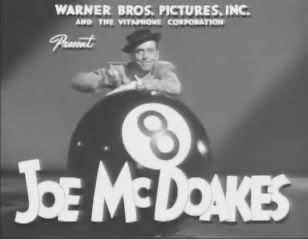 I knew I'd written about actor George O'Hanlon before. You're most likely to see him on TCM in the old "Joe McDoakes" series. TCM lists one of them, So You Want to Be in Pictures (1947), as airing next Monday evening at about 6:45 PM, just after Easy to Love. Other than that, about everything that could be said about O'Hanlon was written in the original post two and a half years ago.
I knew I'd written about actor George O'Hanlon before. You're most likely to see him on TCM in the old "Joe McDoakes" series. TCM lists one of them, So You Want to Be in Pictures (1947), as airing next Monday evening at about 6:45 PM, just after Easy to Love. Other than that, about everything that could be said about O'Hanlon was written in the original post two and a half years ago.
And by the way, Bop Girl Goes Calypso still hasn't gotten a DVD release.
Posted by
Ted S. (Just a Cineast)
at
8:18 AM
0
comments
![]()
![]()
Monday, November 22, 2010
Footlight Parade
Of the various genres to become popular in the 1930s, the musical is near the top. As I've mentioned with 42nd Street, thanks to Busby Berkeley, viewers were treated to ever more spectacular musical numbers. Another of Berkeley's efforts shows up on TCM tonight: Footlight Parade, at 9:00 PM ET.
James Cagney stars as Chester Kent, a vaudeville producer left scrambling for work after the Depression more or less killed off vaudeville. That, and the moving picutres, now that the pictures can talk. However, with the Depression, even the movie theaters need gimmicks to bring in the patrons, and that's where Kent comes in. He's got his old gang who can produce "prologues", live musical numbers that will be performed for the audiences before the picture begins. It's still a cut-throat business, though; he's got a gold-digging girlfriend (Claire Dodd) to deal with, as well as two guys (Guy Kibbee and Hugh Herbert) who would steal his material. He's helped out though, by his able secretary (Joan Blondell) who would be a better match for him than Dodd. Along the way, Ruby Keeler and Dick Powell become the stars of the prologues and fall in love....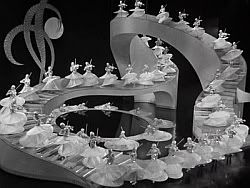 In a movie like Footlight Parade, the story is second to the elaborate musical numbers, which bear no resemblance to reality. Nobody has a staircase like the one in Gold Diggers of 1933, and no movie theater could hold all the waterworks needed for the musical numbers in Footlight Parade. Never mind the prohibitive cost of the stuff, either. Audiences wanted escapism, and got it in droves. This also being 1933, they were treated to copious amounts of the mildly racy material that would be gone from movies just a year later thanks to the Production Code.
In a movie like Footlight Parade, the story is second to the elaborate musical numbers, which bear no resemblance to reality. Nobody has a staircase like the one in Gold Diggers of 1933, and no movie theater could hold all the waterworks needed for the musical numbers in Footlight Parade. Never mind the prohibitive cost of the stuff, either. Audiences wanted escapism, and got it in droves. This also being 1933, they were treated to copious amounts of the mildly racy material that would be gone from movies just a year later thanks to the Production Code.
Even though Footlight Parade was made for its musical numbers, it would be a bit unfair not to mention the acting performances. Most of the folks here were staples of the Warner Bros. lot, and had worked together a number of times. Cagney is great as always, and it's a shame that he got shunted into more "serious" gangster roles than fun stuff like this. Joan Blondell is good as the cynical but no-nonsense secretary, although it would also be interesting to see wisecracking Glenda Farrell in the role. Keeler and Powell are their usual selves, basically reprising the roles they had done in 42nd Street. And Guy Kibbee is always fun to watch.
Footlight Parade got a DVD release as part of a Busby Berkeley boxset a few years back, but also seems to have gotten the individual DVD treatment.
Posted by
Ted S. (Just a Cineast)
at
9:05 AM
0
comments
![]()
![]()
Labels: Dick Powell, James Cagney, Joan Blondell, musical
Sunday, November 21, 2010
A few comments on silents
Tonight's Silent Sunday Nights feature on TCM is The Viking, coming up at midnight ET tonight. Some of the plot elements -- a Viking and his English slave falling for the same woman -- may sound similar to the later The Vikings, but that's where the similarities end. The earlier silent is interesting for any number of reasons. First, it stars Donald Crisp as Leif Ericsson. It's easy to forget that that Crisp had a relatively distinguished career in the silents, when he would go on to win an Oscar for a movie like How Green Was My Valley. Secondly, the movie is in two-strip Technicolor, one of a few silents entirely in two-strip.
Today also marks the birth anniversary of Jobyna Ralston (1899-1967), who is probably best known for her role opposite Harold Lloyd in The Freshman (pictured above). Ralston is one of the many whose careers effectively ended with the end of the silent era, thanks to a speech defect she had.
Posted by
Ted S. (Just a Cineast)
at
9:01 AM
0
comments
![]()
![]()
Labels: Silent
Saturday, November 20, 2010
Repeats and wish lists
TCM's Essential for this week is San Francisco, which was also an Essential back in June and is airing at 8:00 PM ET. Last time, it was the jumping-off point for a night of movies set in the City by the Bay; this time, the night's subject is Spencer Tracy. One of his earliest movies follows at 10:00 PM, Up the River, which also just happens to have one of Humphrey Bogart's earliest performances.
As for movies I've always wanted to see, one of the, A Summer Place, is coming up tomorrow afternoon at 2:00 PM on TCM. I don't think I've seen any of it before, and let's just hope that it turns out to be better than The Naked Maja, or if not, then at least maybe the football games will be interesting.
A Summer Place is one I've always kind of wanted to see just because the theme is very well known, thanks to Percy Faith's instrumental version (which is, according to IMDb, not in the movie). There are, though, other movies that I saw part of many years ago, back in the old days of independent TV channels that showed old movies, but didn't get to see in their entirety, or that I did see, but would like to see again. Thanks to TCM, I've been able to cross The Solid Gold Cadillac and The Cranes Are Flying off of that list. Others, such as The D.I., still haven't made it to TCM. (It is, however, part of the Warner Archive, but those DVDs are expensive.)
And then there are the movies I saw in Germany, which dubs movies rather than using subtitles (or at least did when I was there back in 1989). The one I remember showing up was The Web, which is unfortunately a Universal movie, so is less likely to show up on TCM than The D.I., which is from Warner Bros. (As an aside, a lot more of the post-1950 Warner films, which didn't make it to the original Turner Library, are showing up on TCM.)
Posted by
Ted S. (Just a Cineast)
at
2:07 PM
0
comments
![]()
![]()
Friday, November 19, 2010
The frequency of Fox repeats
It's hard to believe it's only been six weeks since I discussed the Fox Legacy piece on Tyrone Power. And yet, here it is again, airing tonight at 8:00 PM ET. This week, however, the two Power movies playing are different than the ones back in October, which is a big plus. I haven't seen The Black Rose before; that comes on at 8:30 PM. It's followed by Lloyd's of London, which I recommended back in April.
Posted by
Ted S. (Just a Cineast)
at
9:29 AM
0
comments
![]()
![]()
Labels: Fox
Thursday, November 18, 2010
Ava Gardner, Night 3
Tonight is the third Thursday of Ava Gardner's turn as TCM's Star of the Month. I'm looking forward to The Naked Maja, which I haven't seen before, kicking the night off at 8:00 PM ET. Coming up quite a bit later, early tomorrow morning at 5:00 AM, is The Hucksters
"Hucksters", of course, is a word that comes from advertising, and this is a movie about the dark side of the world of advertising. Clark Gable plays an up-an-comer at an ad agency who recently returned from years of service in World War II. He's got a boss in Adolphe Menjou who is trying to manage the contract of tyrannical soap magnate Sydney Greenstreet. Greenstreet's controlling ways, combined with the maxim that the customer is always right, means that whenever Greenstreet says, "Jump", Menjou asks how high. And Menjou wants Gable to jump right alongside him so that he can move up in the advertising world.
Jumping means several things. First is getting war widow Deborah Kerr to sign on as a paid celebrity spokesman for Greenstreet's company. Hollywood's plots being as predictable as they are, you can guess that Gable is going to fall in love with Kerr. Things get a little more complicated when Gable meets nightclub singer Gardner and falls in love with her, too. And then there's Greenstreet's next flighty idea. He's taken a liking to comedian Keenan Wynn, and wants to get Wynn a radio show out on Los Angeles. Gable has to get the job done, or else Greenstreet will take his business to another company. The only problem is, Wynn's material is oh-so-unfunny.
It all sets up a series of moral conflicts for Gable, but because this film was made under the Production Code and made at glitzy MGM instead of socially conscious Warner Bros., the best we can hope for is that Gable comes to his moral senses in the way Jack Lemmon does in The Apartment. In reality, he and Menjou are more like the Claude Rains character in Mr. Smith Goes to Washington. Still, The Hucksters is worth watching for Sydney Greenstreet's performance. Despite being billed third, he's the star who shines most.
The Hucksters has not received a DVD release, not even to the Warner Archive collection. So you'll have to watch TCM's showing.
Posted by
Ted S. (Just a Cineast)
at
8:38 AM
0
comments
![]()
![]()
Labels: Adolphe Menjou, Clark Gable, Deborah Kerr
Wednesday, November 17, 2010
Rock Hudson, 1925-1985
Today marks the birth anniversary of Rock Hudson, that masculine icon of 1950s romantic comedies who, it turned out, was gay and one of the first prominent AIDS victims. I have to admit to not being a huge fan of the Hudson movies I've seen, in part because I'm not that enamored of Doris Day. Looking through his filmography, though, there are a couple of his movies I'd be interested in seeing:
I Was a Shoplifter was one of his earliest credits, in which he plays a store detective in a movie about, you guessed it, the shoplifting ring, known in those days as "boosters". (The idea of professional shoplifting rings is also mentioned in Caged, as one of the possible jobs for Eleanor Parker's character to get.) The movie sounds delightfully bad, with Charles McGraw again playing a detective, and a young Anthony Curtis (who would of course later become Tony) playing a thug.
Back to God's Country. This is a talking version of the 1919 Canadian movie of the same title, which is the earliest known surviving Canadian movie, and which has a famous "nude" scene. Technically, the woman isn't nude; she's got a red swimsuit on, but the cameras in those days couldn't pick up the red so well, and with the camera doing mostly medium and long shots, it makes it look like the woman, who is bathing in a stream, is actually naked. It's not revealing at all, but apparently it was a bit scandalous at the time.
Avalanche, one of those 1970s disaster movies about a ski lodge that gets trapped in an avalanche. Unfortunately, the producers couldn't get the A-list stars that they did for other 1970s disaster flicks. Of the three movies, this is the only one available on DVD.
Posted by
Ted S. (Just a Cineast)
at
8:30 AM
0
comments
![]()
![]()
Tuesday, November 16, 2010
Not everybody knows about the movies
 So I was watching Who Wants to Be a Millionaire yesterday, and the contestant got to a question that went something like this: "The controversial 1998 book As Time Goes By tells the stories of Rick, Ilsa, and Victor after the end of what movie?" Now, anybody who reads a blog like this will probably know the answer without needing the four choices. The contestant sees the four choices, and says roughly, "I know that Ilsa was in The Sound of Music, so I'll say The Sound of Music, final answer." Oh, dear.
So I was watching Who Wants to Be a Millionaire yesterday, and the contestant got to a question that went something like this: "The controversial 1998 book As Time Goes By tells the stories of Rick, Ilsa, and Victor after the end of what movie?" Now, anybody who reads a blog like this will probably know the answer without needing the four choices. The contestant sees the four choices, and says roughly, "I know that Ilsa was in The Sound of Music, so I'll say The Sound of Music, final answer." Oh, dear.
I think this encapsulates one of the problems faced by TCM in its programming. Some of the people who are avid movie fans will go nuts when TCM schedules Casablanca or Gone With the Wind yet again in prime time. And yet, there are clearly people who don't know movies like this well enough to avoid having a brain cramp about them on national television. Does anybody really expect the average TV watcher to get excited if TCM schedules something like The Millionaire as opposed to Slumdog Millionaire in prime time?
Posted by
Ted S. (Just a Cineast)
at
8:08 AM
0
comments
![]()
![]()
Monday, November 15, 2010
Man on a Tightrope
I mentioned a week ago in conjunction with the new Elia Kazan box set that one of the new-to-DVD movies, Man on a Tightrope, was coming up soon on the Fox Movie Channel. That "soon" is tomorrow morning at 8:00 AM ET.
The scene is Czechoslovakia of the early 1950s, not long after the Communist takeover. Fredric March plays Karel Černik, the head of a circus troupe who also used to be its owner until the circus was nationalized by the Communist authorities. He doesn't like the Communists not only because they've taken his circus, but because the Communists were constantly engaging in arbitrary impositions on everybody that made life difficult: you didn't know how the Communists were going to make like difficult next, or whether they were going to come after you. His personal life is also a mess, with a second wife (Gloria Grahame) with whom he's having relationship problems as she likes some of the better-looking members of the troupe; and a daughter (Terry More) who, having grown up, is showing interest in men (Cameron Mitchell) her father doesn't particularly approve of.
So, it's only natural that Mr. Černik has a desire to escape. Escape alone isn't really an option as it would leave his family and the circus troupe he really does like behind. So, he comes up with a daring plot that would have his troupe go to the border to "perform" for the border guards, and "perform" their way right across the border. One of the many impositions put upon the circus troupe, however, was the implanting of spies, so Černik has to be careful about whom he lets in on his plan for escape. The one person who does know, and has the power to stop Černik, is the local Party boss, played by Adolphe Menjou. And he certainly plans to stop them....
Man on a Tightrope is a well-acted little movie with a tight storyline. After the end of the Hollywood blacklist, the anti-anti-Communists have held sway, with the result that anything anti-Communist from the early 1950s gets unfairly maligned. Sure, some of the movies are lousy, but some such as this one are quite good. What's interesting about its portrayal of Communism is that it's doesn't do anything lurid to portray the Communist violence against the individual, the way that movies like The Big Heat or The Phenix City Story are very up front about the badness of their antagonists. Instead, the inherent evil of Communism is shown in people being forced to lie to themselves and the people closest to them, as well as in a thoroughly arbitrary state. Indeed, as with the Stalinist purges in the Soviet Union, the heavy hand of the state can even hit local bosses like the one portrayed by Menjou.
I'm glad that Man on a Tightrope has gotten a DVD release, becuase it's an underrated movie that really deserves more attention.
Posted by
Ted S. (Just a Cineast)
at
9:42 AM
0
comments
![]()
![]()
Labels: Adolphe Menjou, Elia Kazan, Fox, Fredric March
Sunday, November 14, 2010
It airs too rarely
TCM is showing The Crimson Kimono tomorrow morning at 9:30 AM ET. I think the last time that it showed up on TCM was back in the Race and Hollywood series on Hollywood's look at Asians back in the spring of 2008. That's much too long between airings.
James Shigeta and Glenn Corbett play a pair of police detectives in Los Angeles who also served together in the Korean War, with Shigeta saving Corbett's life with a blood transfusion. They're called to investigate the murder of a stripper, which leads them to a portrait of her that remained in her apartment. They find that the artist who painted the portrait is a student at USC, and that she's apparently in danger from the killer, too. As the two detectives protect her, they both begin to fall in love with her, which poses big problems. Not only is there a conflict between them; there's also the pesky matter of an interracial relationship, which was still a big thing back in the late 1950s....
To be honest, despite having watched this movie when it aired in the Race and Hollywood series, it's one of those movies like Brighton Rock that I don't remember as well as I probably should. In fact, I remember Shigeta's performance in Bridge to the Sun much better. That having been said, I didn't have anything against the movie, and am looking forward to seeing it again.
The Crimson Kimono has gotten a DVD release as part of a Sam Fuller box set, although as far as I am aware it hasn't been released individually.
Posted by
Ted S. (Just a Cineast)
at
12:26 PM
0
comments
![]()
![]()
Saturday, November 13, 2010
The Hitchcock completist
Back in 2004 or 2005, TCM had an Alfred Hitchcock week, running the famed director's movies every night in prime time, and into the wee hours of the morning. Some of the director's early work in Britain got aired, but most American viewers will recognize Hitchcock for movies from Rebecca onwards, that being the first movie Hitchcock made for David O. Selznick after coming over to the US. By my reckoning, of the movies Hitchcock made from Rebecca onwards, TCM is now down to two that haven't gotten shown since before the Hitchcock festival: Lifeboat, which is a Fox film; and Under Capricorn. One that only recently got stricken from the list is I Confess, which is getting another airing tomorrow at noon ET.
As with many of Alfred Hitchcock's films, I Confess is not a mystery, but a suspense film: Hitchcock lets us in on the secret early on. In this case, that secret is Otto Keller's (O.E. Hasse) murder of a lawyer in Québec City. Keller is a caretaker at one of the church rectories, and after committing the deed, he returns to the church, where he summons Fr. Logan (Montgomery Clift) to the confessional, and under the seal of confession, confesses to having killed this man. This sets up a fairly trite conflict, that of a priest not being allowed to violate the sanctity of the confessional. (Personally, I'd think that part of the penance ought to be admitting the crime to the police, and that God cannot grant salvation until the sinner does so. Apparently that's not the way the Catholic Church works.) Logan can't reveal what he knows, which turns out to be a huge problem, as he knew the victim. Inspector Larrue (Karl Malden), who has the task of investigating the murder, knows not only that Fr. Logan was acquainted with the victim, but that Logan is trying to hide something, which naturally places suspicion on Logan.
What Logan is hiding is a relationship he had had a decade earlier with Ruth (Anne Baxter), who is now married to a member of the Québec legislature. Before World War II, Logan had not taken the priestly vows, and was in love with Ruth. The war changed all that, and while Logan was facing the horror of war that caused him to become just friends with Ruth and want to join the priesthood, Ruth, realizing Logan was no longer in love with her, entered into a marriage of opportunity. Logan returned from the war and wants to tell Ruth what happened but, before she can tell him she's gotten married, the two get caught alone together by the eventual murder victim, who proceeds to blackmail Ruth (which conveniently also gives her and Logan the motive for the killing).
Now, we know that because of the Production Code, the real killer is going to get revealed to the authorities. But how it happens is what makes the movie interesting. I Confess is generally considered one of Alfred Hitchcock's "lesser" movies, but that's a bit unfair. If the movie has any problem, it's only that it's nondescript in that there's not really anything to make it stand out the way Alfred Hitchcock's other movies do. Still, Montgomery Clift and Karl Malden both deliver excellent performances. As with most of Hitchcock's movies, it's gotten a DVD release, so even if it doesn't show up on TCM all that often, you can watch it whenever you want.
Posted by
Ted S. (Just a Cineast)
at
3:14 PM
0
comments
![]()
![]()
Labels: Alfred Hitchcock, Karl Malden, Montgomery Clift
Friday, November 12, 2010
There's something about Van Heflin
To be honest, Van Heflin isn't the greatest actor out there. I shudder, for example, at the thought of him doing comedy. And yet, he's been enjoyable in almost everything I've seen him in. That's true even when he's miscast, as in The Prowler, airing tomorrow morning at 8:30 AM ET on TCM.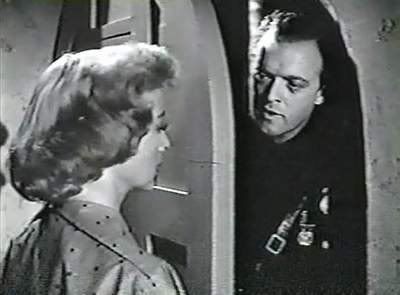 Van Heflin stars as Webb Garwood, a Los Angeles police officer partnered with Bud Crocker (John Maxwell). One night the two get called to investigate the presence of a possible prowler at the home of femme fatale Susan Gilvray (Evelyn Keyes). They don't find a prowler, but Webb finds Susan irresistible. She apparently finds him the same way too, as she strikes up a relationship with him, even though she's already married to a disk jockey who does the overnight shift. One night when Webb tries to see Susan, he's interrupted by her husband, who happens to be home. Webb mistakes(?) the man for the original prowler, and shoots him dead.
Van Heflin stars as Webb Garwood, a Los Angeles police officer partnered with Bud Crocker (John Maxwell). One night the two get called to investigate the presence of a possible prowler at the home of femme fatale Susan Gilvray (Evelyn Keyes). They don't find a prowler, but Webb finds Susan irresistible. She apparently finds him the same way too, as she strikes up a relationship with him, even though she's already married to a disk jockey who does the overnight shift. One night when Webb tries to see Susan, he's interrupted by her husband, who happens to be home. Webb mistakes(?) the man for the original prowler, and shoots him dead.
This turns out to be a blessing in disguise for Webb and Susan, as they can now live their relationship relatively unencumbered, as long as he quits his job and moves with her to another state where nobody will recognize the two of them. They just have to get through the coroner's inquest first, which requires the two to perjure themselves. The Production Code won't let them get away with perjury, of course, so when the inquest finds accidental death, we know that there's going to be a twist. Sure enough, it comes once the pair has gotten married and bought a motel in Las Vegas. Susan informs Webb that he's knocked her up, and Webb realizes their goose is cooked. The presence of this unborn baby will prove that the two were carrying on a relationship before her first husband died, and get them convicted on those perjury charges. So they have to figure out a way to solve their baby problems.
When I first watched the movie I thought they should just go to Mexico, but apparently the suits in Hollywood are brighter than I am, and decided that twisting the plot beyond any semblance of reality was a better idea. Suffice it to say that crime doesn't pay; how it doesn't pay is an exercise left to the viewer. Even though there are plot problems, The Prowler is still an entertaining movie. And even though Heflin looks so out of place in that uniform, he still does a good job and makes the movie worth watching.
Sadly, The Prowler isn't on DVD, so you'll have to catch the TCM showing.
Posted by
Ted S. (Just a Cineast)
at
2:43 PM
1 comments
![]()
![]()
Labels: noir, Van Heflin
Tin foil hats
I commented again recently on my not caring for the 1970s-era conspiracy theory movies. With tin foil hats being a metaphor for folks who believe in such conspiracies, I find it interesting that a movie that involves real metallic headgear comes up in this week's TCM Underground: They Came From Beyond Space, overnight at 3:45 AM ET.
This British sci-fi movie involves something that looks like a meteor shower falling on rural England, only for strange things to start happening. The scientists begin to investigate, and soon enough, all of them begin to conspire to keep the hero of the story from investigating further. Why? Well, if it involves metallic headgear, you can probably guess the reason why. This is a movie that, on the face of it, is really lousy. But it's perfect for TCM Underground in that it's the sort of movie that's so horrible it winds up being a lot of fun. And that's the sort of movie I like.
Amazingly enough, They Came From Beyond Space has gotten a DVD release in several different sci-fi themed sets.
Posted by
Ted S. (Just a Cineast)
at
8:00 AM
0
comments
![]()
![]()
Labels: British, science fiction
Thursday, November 11, 2010
Mogambo vs. Red Dust
TCM is airing Mogambo tonight at 8:00 PM ET as part of the salute to Star of the Month Ava Gardner. It's a remake of the earlier Red Dust, with Clark Gable playing the male lead in both movies. To be honest, I prefer Red Dust.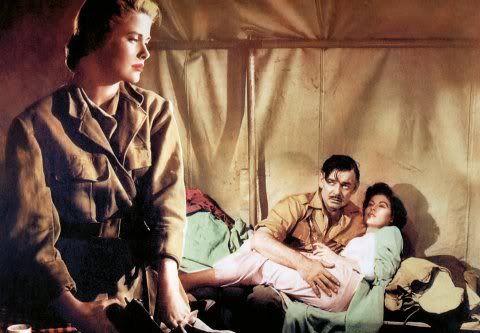
In Mogambo, Ava Gardner plays a chorus girl stuck in Africa with big-game hunter Clark Gable, who falls in love with her. Then, Grace Kelly shows up with her husband, and Gable falls in love with Kelly, leading to predictable tension. In Red Dust, the Gardner part is taken by Jean Harlow, while the Kelly part is played by Mary Astor. (Red Dust is set on a rubber plantation in Indochina, but that's not important here.) I think the women are better cast in Red Dust: Jean Harlow exudes much more raw sexuality than Gardner, and the fact that Red Dust was made before the imposition of the Production Code makes it easier to show off the steaminess. As for Grace Kelly, she's lovely, but generally comes across as much too icy. Mary Astor has more ambiguity to her, and you can see why she would become disillusioned being stuck in the middle of nowhere and fall for Gable.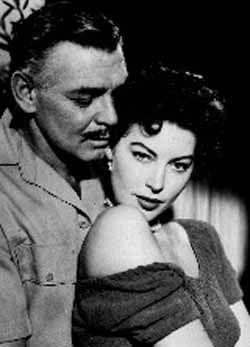 Also, Clark Gable was in his early fifties when he made Mogambo. I always knew he hadn't aged well, although part of that was colored by having seen Any Number Can Play, where his character is supposed to be somebody whom time has treated badly. Things don't get better by the time he made Mogambo. The one thing Mogambo does have going for it over Red Dust, though, is the fact that it was made on location, and in beautiful Technicolor. It's not a terrible movie by any stretch of the imagination, either; I just find it inferior to the original.
Also, Clark Gable was in his early fifties when he made Mogambo. I always knew he hadn't aged well, although part of that was colored by having seen Any Number Can Play, where his character is supposed to be somebody whom time has treated badly. Things don't get better by the time he made Mogambo. The one thing Mogambo does have going for it over Red Dust, though, is the fact that it was made on location, and in beautiful Technicolor. It's not a terrible movie by any stretch of the imagination, either; I just find it inferior to the original.
Mogambo has been released to DVD; Red Dust apparently hasn't. But you can watch Red Dust in a little under two weeks on TCM, at 5:00 AM ET on November 23. (That is, the very beginning of Tuesday morning; TCM lists it as being late late in the night on Monday.)
Posted by
Ted S. (Just a Cineast)
at
12:48 PM
0
comments
![]()
![]()
Labels: Clark Gable, Grace Kelly, Jean Harlow
A belated shout out
 I've been meaning for a couple of days now to write a post about the blog Laura's Miscellaneous Musings. Every couple of days I check the statistics on my blog, and notice that most of the limited traffic to my site comes from two sources: web searches, and links to the blog that I myself make on some of the various other spots I hang out on the web. The other day when I looked up the stats, I saw I had gotten several hits courtesy of Laura's blog, and finally decided to head on over there.
I've been meaning for a couple of days now to write a post about the blog Laura's Miscellaneous Musings. Every couple of days I check the statistics on my blog, and notice that most of the limited traffic to my site comes from two sources: web searches, and links to the blog that I myself make on some of the various other spots I hang out on the web. The other day when I looked up the stats, I saw I had gotten several hits courtesy of Laura's blog, and finally decided to head on over there.
I tend to write off the cuff, which is obviously why it took a few days for me to get around to thanking her for the traffic, or why I didn't write about the Elia Kazan box set the day it was released (or why I miss the releases of other box sets). Laura obviously takes more time to prepare her posts than I do, and I suppose it shows. So, to anybody who's come over here from Laura's blog, thank you for the traffic!
Now off to find some gratuitous photos of Ava Gardner for tonight's TCM showing of Mogambo....
Posted by
Ted S. (Just a Cineast)
at
7:34 AM
0
comments
![]()
![]()
Labels: administrative
Wednesday, November 10, 2010
Elia Kazan box set
Yesterday saw the release of a huge, 18-DVD Elia Kazan box set. Of course, having 18 DVD's isn't exactly cheap, and there's a list price approaching $200, although at Amazon you can get a 30% discout making the set cost "only" $140.
Unsurprisngly, Kazan's major works, such as Gentleman's Agreement, A Streetcar Named Desire, and On the Waterfront, are all part of the set. Five of the movies are new to DVD, including Wild River, which I blogged about back in April 2009. There's also the underrated anti-Communist drama Man on a Tightrope, which is currently in the Fox Movie Channel rotation, getting two airings later in November and one in December; it's going to be the subject of a blog post when one of those future airings is scheduled. Appaarently, A Tree Grows in Brooklyn never made it to DVD in the US before this.
Sadly, the information on the box set says that at the present time, there are no plans to make any of the DVDs from this box set individually available. Still, if you're looking to start a DVD collection, I suppose there could be worse places to start.
Posted by
Ted S. (Just a Cineast)
at
7:18 AM
0
comments
![]()
![]()
Labels: Elia Kazan, Marlon Brando, Montgomery Clift
Tuesday, November 9, 2010
Should I file this under Fox?
Tonight on TCM brings this month's Guest Programmer, actor Michael J. Fox. To be honest, two of his four selections aren't my favorites, and one I haven't even seen before. But I'm sure there are people out there besides Fox who would enjoy his selections.
I've intimated that I don't particularly care for Dr. Strangelove Or: How I Learned to Stop Worrying and Love the Bomb which kicks off the night at 8:00 PM ET.
I haven't seen Local Hero, at 10:00 PM, before, and so can't comment on it.
I find a lot of the 1970s conspiracy theory movies to be tedious and predictable; such is the case with Fox's third selection, The Parallax View, at midnight.
The one of Fox's four picks that I really enjoy is Kind Hearts and Coronets, at 2:00 AM.
Posted by
Ted S. (Just a Cineast)
at
8:03 AM
0
comments
![]()
![]()
Monday, November 8, 2010
We're Rich Again
 Tomorrow marks the birth anniversary of Edna May Oliver, and TCM is marking the occasion with a day of her movies. I mentioned The Penguin Pool Murder back in September; that's airing at noon ET. The other of her Hildegarde Withers mysteries, Murder at the Blackboard, also shows up, at 2:30 PM. One of Oliver's movies that I haven't mentioned before is a bizarre little B comedy that winds up being so bizarre it's fun: the 1934 film We're Rich Again, at 3:45 PM.
Tomorrow marks the birth anniversary of Edna May Oliver, and TCM is marking the occasion with a day of her movies. I mentioned The Penguin Pool Murder back in September; that's airing at noon ET. The other of her Hildegarde Withers mysteries, Murder at the Blackboard, also shows up, at 2:30 PM. One of Oliver's movies that I haven't mentioned before is a bizarre little B comedy that winds up being so bizarre it's fun: the 1934 film We're Rich Again, at 3:45 PM.
Oliver gets top billing, although she's not really the main character. That honor goes to character actor Grant Mitchell, playing Wilbur Page, the patriarch of a family that would like to be middle class, but is unfortunately drowning in a sea of debt. He wants to marry his daughter off to the son of a wealthy family, but can't really afford the wedding thanks to that debt. In fact, the process servers are on his doorstep, in the form of Edgar Kennedy. Billie Burke, seemingly reprising her role from Dinner at Eight, plays the mother, and she's about as ditzy and oblivious to reality here as she was in the earlier movie.
Into all of this mess walk several characters. First is the aforementioned Oliver, who is Burke's mother. She's a polo-playing granny, and is constantly surrounded by young men in polo shirts that are just a bit too tight. You'd think that if she could afford to play polo, she'd have the money to help out her son-in-law, but apparently not. Then there's "country cousin" Marian Nixon, whose presence serves as little more than adding more mayhem to poor Grant Mitchell's life. Perhaps funniest of all, however, is Buster Crabbe. The former Olympic swimmer turned actor shows up in just is Olympic swimming trunks, and his presence is a running joke that involves him never more dressed than his swim trunks, including taking a trip to Mexico and getting involved in two weddings. On top of that, he never gets a line of dialogue. He just shows up, and who knows why he's there. Eventually, Father's financial problems get solved somehow, and almost everybody presumably gets to live happily ever after, although that's kind of beside the point.
We're Rich Again is the sort of movie that I probably shouldn't like. Grant Mitchell's character goes around creating an ever more elaborate set of lies in order to keep the process server at bay, and that sort of comedy-by-lies is something I generally dislike. But We're Rich Again is warped, thanks to the presence of Oliver, Crabbe, and Burke. There's a "what were they thinking" vibe that permeates the movie, and thanks the the presence of people who could actually do comedy well, the movie winds up being interestingly bizarre, as opposed to a lousy bizarre. Unsurprisingly, because it's a B movie with no real stars, We're Rich Again hasn't been released to DVD.
Posted by
Ted S. (Just a Cineast)
at
6:51 PM
0
comments
![]()
![]()
Within Our Gates
TCM's second installment of Moguls and Movie Stars, at 8:00 PM ET tonight looks at the birth of the movie industry in Hollywood, that being the silent films of the 'teens of the last century. The Birth of a Nation gets an airing at midnight. D.W. Griffith's classic is generally more remembered today for its racist attitudes. One of the many results of that was to spur the beginning of a black filmmaking industry to tell stories by blacks for blacks. One of the earliest surviving examples is the movie Within Our Gates, which is airing overnight at 3:30 AM.
The story is of a light-skinned black woman in Boston who gets rejected by her fiancé and, as a result, moves back south, where she becomes a teacher at one of the segregated black schools. This being the South of the Jim Crow era, there's not much help from the government, and so our heroine is forced to go back to the North to try to raise money for the school. However, she finds that even the North isn't as progressive-minded as people today might like to think, with both the wealthy whites and the black population rebuffing her. This may have something to do with her past, which is revealed at the end of the movie.
The "race films", as they were called, were made on shoestring budgets, since black filmmakers didn't have access to the resources that the mainstream Hollywood studios did. As a result, the acting ranges from some being as good as white actors of the day to well-meaning amateurs. The same goes for the production values and storylines. Regarding Within Our Gates, all of these problems show up, especially in the story line, which is tough to follow. Still, director Oscar Micheaux made a movie that isn't bad and is certainly well-worth watching for its portrayal of the race issues of the day which, as far as I can tell are reasonably accurately presented; after all, there really was a vigorous debate between the Booker T. Washingtons of the world who thought black advancement would be better served by education and being model citizens, and the W.E.B. Duboises who believed blacks needed to be more strident in demanding their equal rights. There's one character who makes it a point to mention the contributions that black soldiers made in the Spanish-American War and the recently-ended World War I. Ninety years on it looks dated and as silly as the black scene in It's a Big Country but, coming from a black director, it's easy ot see the point Micheaux was trying to make.
As with Metropolis, Within Our Gates shows the importance of film preservation. The movie had been presumed lost for decades, until the early 1990s when a surviving (but incomplete) print was found in Spain. It's all we have, but it will have to do.
Posted by
Ted S. (Just a Cineast)
at
7:59 AM
0
comments
![]()
![]()
Labels: Silent
Sunday, November 7, 2010
Dean Jagger, 1903-1991

Today marks the birth anniversary of Dean Jagger, who appeared in all sorts of movies in his long career: as Brigham Young in the Fox biopic of the same name, to horror movies such as Revolt of the Zombies, to comedic roles as in the Jim Hutton/Paula Prentiss comedy The Honeymoon Machine. He also won a Best Supporting Actor Oscar, for the 1949 movie Twelve O'Clock High.
The movie starts off with Jagger, playing Army Major Stovall, back in England after the war and finding something in a shop that reminds him of his past. The causes him to want to drive back to the airfield where he spent a pivotal period of World War II. What happens next is the obligatory flashback....
The time is well before D-Day, a time when morale isn't too high. It's particularly low at this particular air base, as the pilots are given the thankless task of running daytime bombing raids over Nazi Germany. Bombing raids are tough enough at night, but during the day, when the enemy can see you, is even worse. Naturally, nobody's happy about this, but somebody's got to do the job. Given the job of increasing the morale of the flyboys is General Savage, played by Gregory Peck.
Savage is determined to give the outfit discipline and a sense of pride, even if the way he goes about it angers his underlings at first: he's a taskmaster who cuts off their liquor, and then proceeds to push them much further than any of them thought they could be pushed. What they don't see is that their general is pushing himself too, possibly to the breaking point.
Peck's General Savage is a tough man and a tough character to play, and Peck does a superb job. Jagger, on the other hand, has the task of playing a foil to Peck, the sort of character who is designed as a source of stability and a contrast to the turmoil that Peck, and everybody else at the base, faces. It's the sort of role that looks easy to play, but in its own was is probably just as difficult as the job Peck had. It's to Jagger's credit that he makes the part look effortless.
Twelve O'Clock High has made it to DVD, so you don't have to wait for it to show up on the Fox Movie Channel.
(Edit: Obviously, I didn't notice that I mistyped the year of Jagger's death. Oope!)
Posted by
Ted S. (Just a Cineast)
at
8:37 PM
0
comments
![]()
![]()
Labels: Gregory Peck, World War II
Metropolis restored
You may have read that several years ago, a bunch of silent film material was found in an archive in Argentina, including material from Fritz Lang's Metropolis that had for decades been considered lost. The restorationists got their hands on the material, and went through the long process of restoring it and putting it back into the movie with the existing material to try to keep as true to Lang's original vision as possible. I haven't seen the restored version yet, but it's airing tonight on TCM at 8:00 PM ET.
Metropolis is the jumping-off point for a night of Lang's movies, including his other early classic, M, starring Peter Lorre as a psychotic child-killer, at 2:30 AM.
Posted by
Ted S. (Just a Cineast)
at
7:57 AM
0
comments
![]()
![]()
Labels: Silent
Saturday, November 6, 2010
Jill Clayburgh, 1944-2010
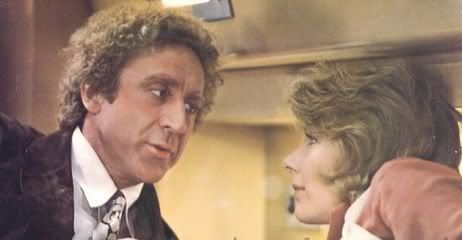
Gene Wilder and Jill Clayburgh in Silver Streak
Jill Clayburgh, who played opposite Gene Wilder in the train comedy Silver Streak and would later go on to earn an Oscar nomination for her role as a divorcée in the movie An Unmarried Woman, has died at the age of 66.
I've already blogged about Silver Streak, back in October 2008. I also made my feelings about An Unmarried Woman known in May 2009. To be honest, it's movies like An Unmarried Woman which are the reason why I don't remember the work of Clayburgh so well. Not that she couldn't act; she does a good enough job in both movies. But she starred in a lot of chick flicks of the sort that nowadays probably wouldn't be made for the big screen, but directly for the Lifetime Channel.
Posted by
Ted S. (Just a Cineast)
at
7:43 AM
0
comments
![]()
![]()
Friday, November 5, 2010
Colonel Bogey
TCM is airing The Bridge on the River Kwai tonight at 8:00 PM ET, followed by a documentary on the making of the movie at 11:00 PM. I haven't seen the documentary, but I can certainly imagine that it must have been a difficult undertaking out in the hot jungle of Sri Lanka.
One of the iconic parts of The Bridge on the River Kwai is the British soldiers whistling the "Colonel Bogey March". The song actually has lyrics, and director David Lean wanted to use them. But, the lyrics were considered too profane to use for general audiences: the first line is, "Hitler has only got one ball". Hence, the whistling. If you want to hear a sung version, you could do worse than the get a copy of Dark Blue World, which I recommended back in June 2008.
Posted by
Ted S. (Just a Cineast)
at
8:02 AM
0
comments
![]()
![]()
Labels: World War II
Thursday, November 4, 2010
Ava Gardner in CSI: 1942
 This being the first week of a new month, we get a new Star of the Month: Ava Gardner, whose movies will be seen every Thursday in prime time on TCM. Tonight's first Ava Gardner movie, at 8:00 PM ET is The Killers, and its presence in the salute to Gardner is why it wasn't used as part of the birthday salute to Burt Lancaster the other day. I'm not quite certain how far through the night the Gardner movies continue, although there are are least four of them, through the Arthurian legend Knights of the Round Table overnight at 2:15 AM. However, Gardner also shows up in a very tiny bit part later on Friday morning, in Kid Glove Killer, at 10:30 AM.
This being the first week of a new month, we get a new Star of the Month: Ava Gardner, whose movies will be seen every Thursday in prime time on TCM. Tonight's first Ava Gardner movie, at 8:00 PM ET is The Killers, and its presence in the salute to Gardner is why it wasn't used as part of the birthday salute to Burt Lancaster the other day. I'm not quite certain how far through the night the Gardner movies continue, although there are are least four of them, through the Arthurian legend Knights of the Round Table overnight at 2:15 AM. However, Gardner also shows up in a very tiny bit part later on Friday morning, in Kid Glove Killer, at 10:30 AM.
Van Heflin is the star of this movie, playing Gordon McKay, the head of a police investigative unit that's much like the CSI units of today, using his knowledge of such things as strands of fabric, paint chips, and things caught under fingernails to help track down killers. He's helped by his lovely assistant Jane Mitchell (Marsha Hunt), although he thinks she should just become a housewife and get married to boyfriend (and local rising political star) Gerald Ladimer (Lee Bowman). Unfortunately, McKay's investigations into the criminal underworld are about to hit Ladimer, as he's actually on the payroll of the mobsters. (We learn this fairly early on, and the movie is more of a suspense movie than a mystery as we know who the bad guy is.) Ladimer responds by making a car bomb, and our investigators have to figure out he's the one who did it, even though he, as a prosecutor, is in on the inner workings of the investigation.
Kid Glove Killer was designed as one of those B-movies to fill out a double bill, but it's really quite fun. This was Van Heflin just before he became a star, and he's good as the somewhat hard-boiled and cyincally sarcastic investigator. Marsha Hunt is nice, but nothing particularly special, as is Lee Bowman. What makes Kid Glove Killer interesting, though, is the 1940s look at crime investigation. I mentioned the fiber analysis and looking under fingernails already, but there's also spectrography to determine the chemical composition of an explosive; as I understand it the presentation of this isn't too inaccurate (although I don't know how much of a database of the composition of commercial explosives they had back in 1942). More humorous is a plot point involving incriminating particles caught in the guilty party's hair: Heflin looks for these by putting a Flowbee-like over the suspects' heads and vacuuming their scalps!
As for Star of the Month Ava Gardner, she appears briefly as a car hop at a drive-in restaurant scene. One other name to watch for is the director: that's Fred Zinnemann, making one of his earliest movies. Kid Glove Killer doesn't seem to be on DVD, though, so you're going to have to watch the TCM showings.
Posted by
Ted S. (Just a Cineast)
at
8:39 AM
1 comments
![]()
![]()
Labels: Fred Zinnemann, Van Heflin
Wednesday, November 3, 2010
Briefs
TCM is reairing Peepshow Pioneers, the first part of its seven-part Moguls and Movie Stars documentary, tonight at 10:00 PM ET. If you missed it on Monday, it's well worth watching. Granted, there was quite a bit that I already knew, but some of the stuff, such as the magic lantern shows, was new to me. They probably could have stood to spend a bit more time on Alice Guy-Blaché as well. Last night, Jeopardy! had a category on "Best Director Oscar winners of the 1960s". Unsurprisingly, the contestants flailed miserably, only knowing who directed The Graduate. It is, of course, the sort of material that would have been right up my alley, although I'll admit I was surprised the category even made it to the game. It seems as though when they have movie categories any more, al the material is on fairly recent movies; certainly those made after I was born (1972).
Last night, Jeopardy! had a category on "Best Director Oscar winners of the 1960s". Unsurprisingly, the contestants flailed miserably, only knowing who directed The Graduate. It is, of course, the sort of material that would have been right up my alley, although I'll admit I was surprised the category even made it to the game. It seems as though when they have movie categories any more, al the material is on fairly recent movies; certainly those made after I was born (1972).
I got a comment!. I should probably apologize for not pointing out that Five Million Years to Earth is one of the Quatermass movies. I have to admit that sci-fi isn't my greatest area of expertise, and I had only seen the movie the previous time it aired on TCM, having missed the beginning of it. It's just that the ending of the movie is so ludicrous that it makes the movie a fun disaster.
Posted by
Ted S. (Just a Cineast)
at
8:42 AM
0
comments
![]()
![]()
Tuesday, November 2, 2010
Gratuitous Burt Lancaster photo thread
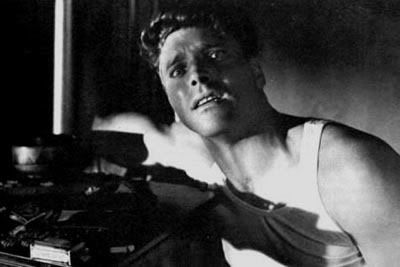
Burt Lancaster at the beginning of The Killers (1946)
Oscar-winning actor Burt Lancaster was born on this day in 1913, and TCM is running a bunch of his movies as a birthday salute. The Killers doesn't happen to be one of them, only because it's part of another TCM feature later this month, that being Ava Gardner's turn as TCM Star of the Month.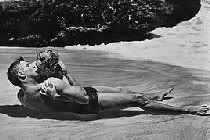 One of the Lancaster movies that is airing, and for which I've already used a photo in a previous post, is From Here to Eternity, at 9:30 AM ET. Of course, there's so much more than just Lancaster on the beach with Deborah Kerr.
One of the Lancaster movies that is airing, and for which I've already used a photo in a previous post, is From Here to Eternity, at 9:30 AM ET. Of course, there's so much more than just Lancaster on the beach with Deborah Kerr.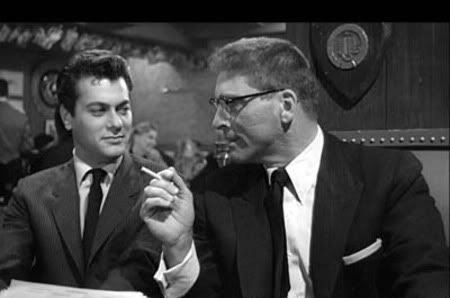 Later, at 1:45 PM, Lancaster dons a pair of glasses to look evil in Sweet Smell of Success, in which he plays a gossip columnist who bosses around press agent Tony Curtis. If you've seen the John Frankenheimer piece on Lancaster that TCM runs so often when they're promoting an upcoming Lancaster movie, you'll note that this was made by Lancaster's own independent production company, Hecht-Hill-Lancaster. (Frankenheimer also made the point about Lancaster and the glasses.)
Later, at 1:45 PM, Lancaster dons a pair of glasses to look evil in Sweet Smell of Success, in which he plays a gossip columnist who bosses around press agent Tony Curtis. If you've seen the John Frankenheimer piece on Lancaster that TCM runs so often when they're promoting an upcoming Lancaster movie, you'll note that this was made by Lancaster's own independent production company, Hecht-Hill-Lancaster. (Frankenheimer also made the point about Lancaster and the glasses.)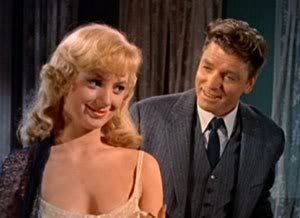 The movie that kicks off the Frankenheimer piece is also Lancaster's Oscar-winning performance, that in Elmer Gantry. However, Elmer Gantry is not on today's schedule.
The movie that kicks off the Frankenheimer piece is also Lancaster's Oscar-winning performance, that in Elmer Gantry. However, Elmer Gantry is not on today's schedule.
Posted by
Ted S. (Just a Cineast)
at
7:26 AM
0
comments
![]()
![]()
Labels: Burt Lancaster
Monday, November 1, 2010
Moguls and Movie Stars
If you've been watching TCM, you've probably seen the promos for the new seven-part documentary, Moguls and Movie Stars. The first part, "Peepshow Pioneers", is airing tonight at 8:00 PM ET, with a repeat at 11:00, and two more repeats on Wednesday evening and Saturday afternoon.
In and of itself, the series sounds interesting, and I'll certainly be watching. However, TCM has also been advertising that many of the films mentioned in the documentary will also be part of the TCM schedule, and tonight's lineup is certainly evidence of that. TCM's schedule has two hours of Thomas Edison shorts at 9:00 PM, two hours of DW Griffith's work at Biograph Pictures around midnight, and two hours of Georges Meliès around 2:00 AM. The last two times are approximate; TCM's on-line schedule lists the times as being just after midnight and 2:00 AM, while the printed schedule lists the Griffith pictures as a single 123-minute feature beginning at midnight, which would obviously push the start time of the Meliès pictures past 2:00 AM. Finally, there's "Silent Shakespeare", a compilation of short silent film versions of Shakespeare's plays, at 4:00 AM.
Posted by
Ted S. (Just a Cineast)
at
7:57 AM
0
comments
![]()
![]()
Labels: Documentary
